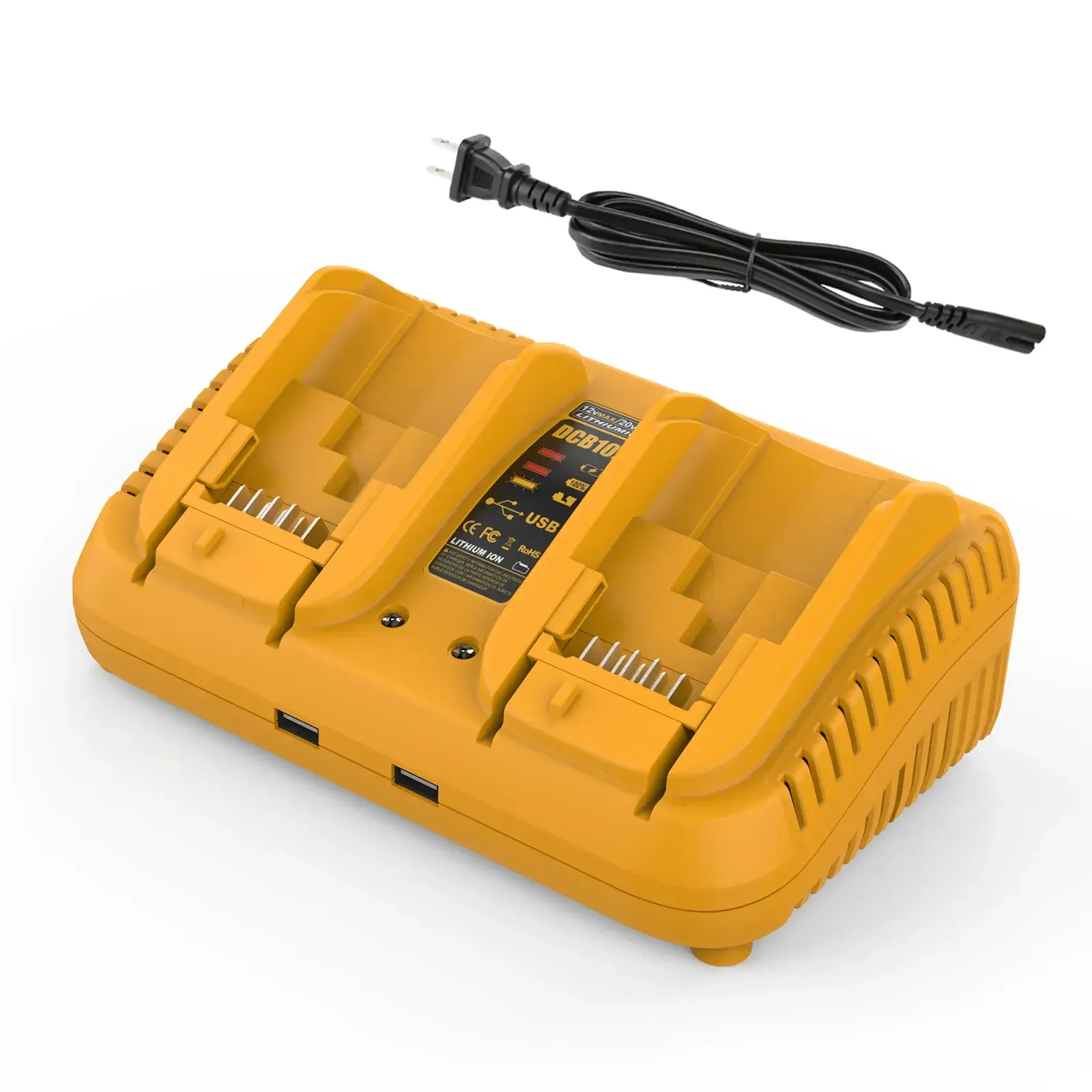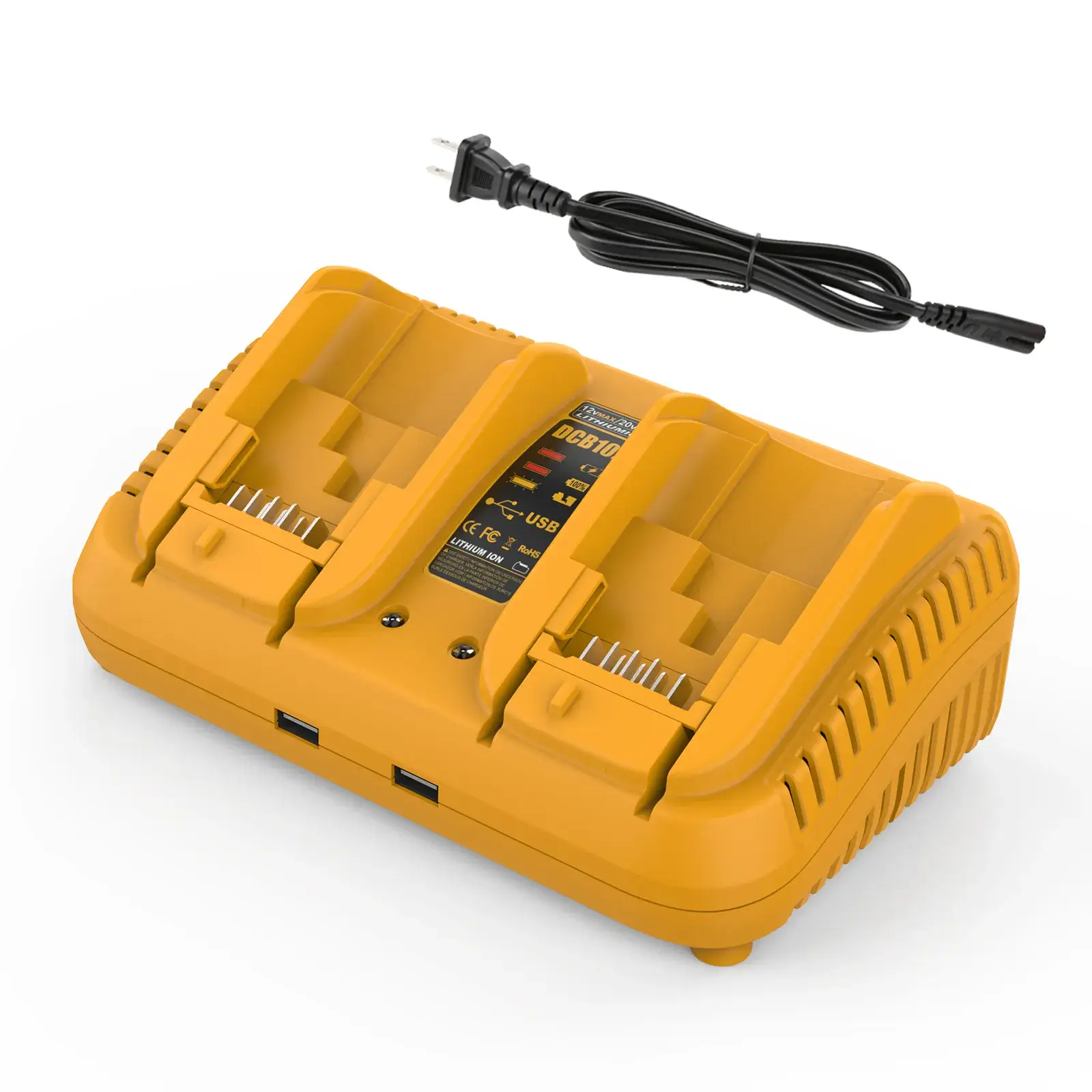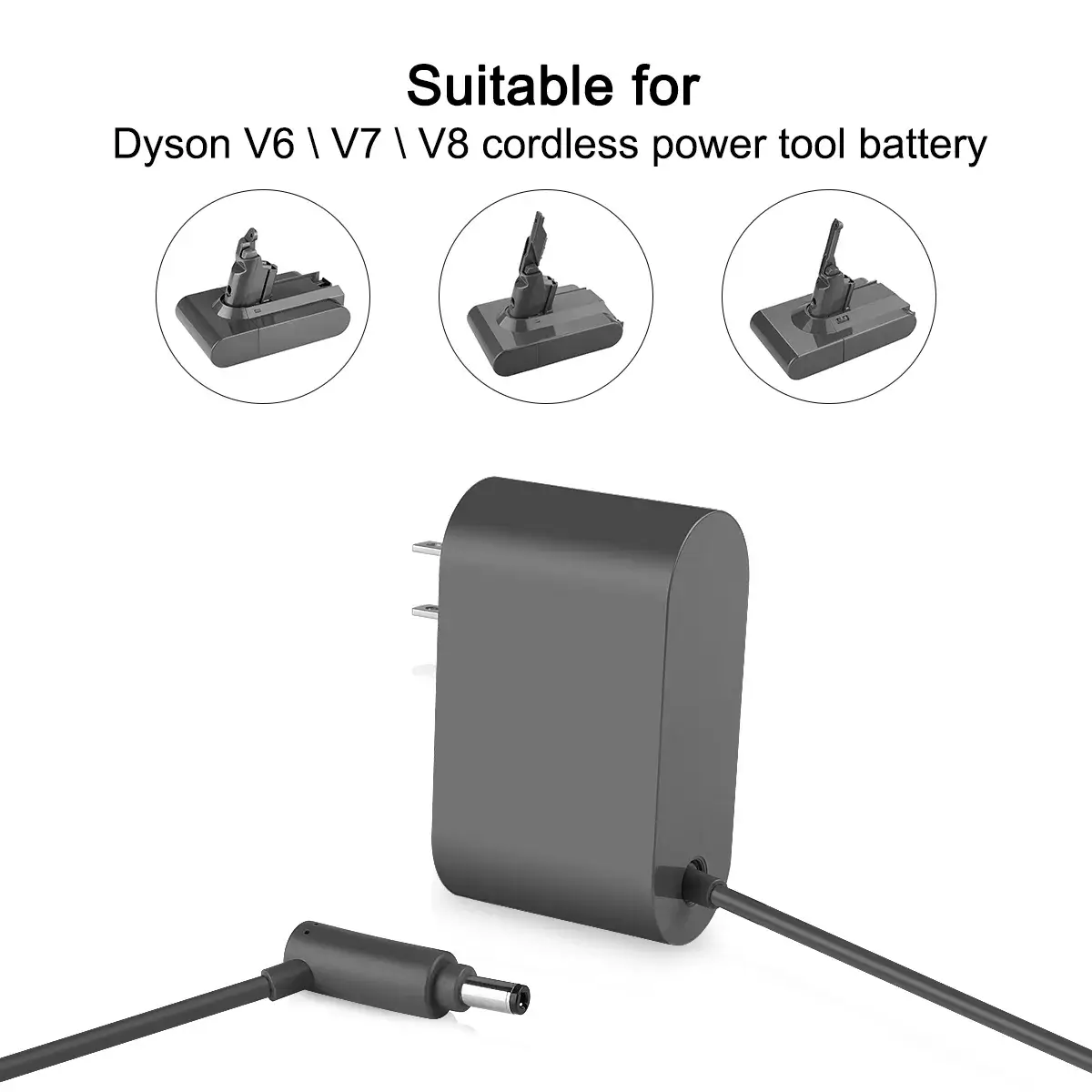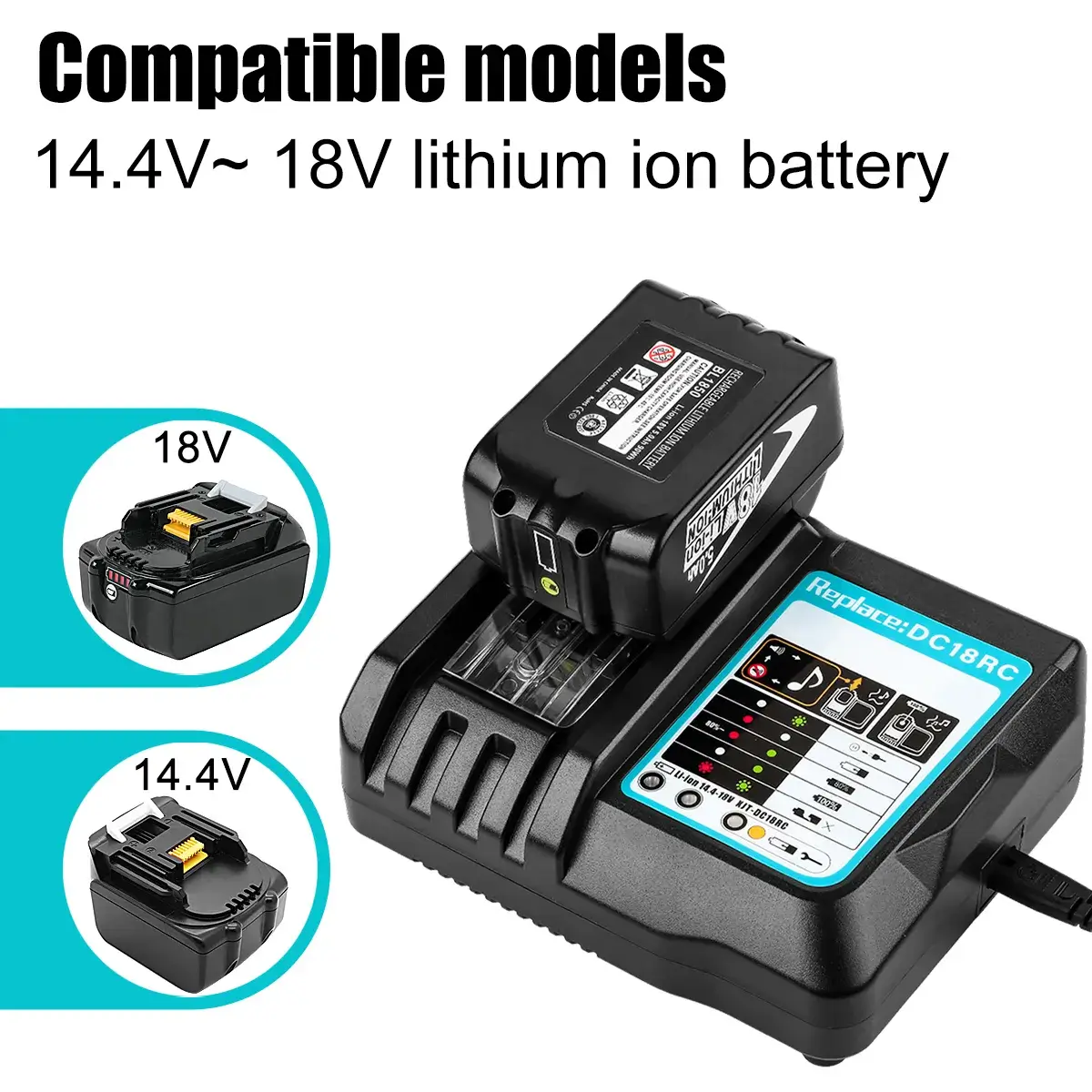How to choose the right power tool battery charger for us
When choosing the right power tool battery charger, you should not only consider the compatibility of battery types (such as lithium, nickel-cadmium, and nickel-metal hydride), but also pay attention to charging speed, safety features (such as temperature control and overcharge protection), and frequency of use, so as to improve work efficiency, extend battery life, and reduce maintenance costs while ensuring safety.

When choosing the right power tool battery charger, consider the type of battery chemistry—whether Li-ion, NiCd, or NiMH—to ensure compatibility. Look for chargers with fast charging capabilities and built-in safety features like overcharge protection and temperature control. Additionally, check for a convenient design with clear indicators or a display, and review warranty terms and customer feedback. Balancing performance, durability, and price will help you select a charger that not only meets your immediate needs but also extends your battery’s lifespan and improves overall efficiency.
Introduction
Selecting the proper battery charger is a cornerstone of both performance and safety in power tool operation. With the rapid evolution of power tool technology, using an incompatible or subpar charger can not only reduce battery longevity but also create significant safety hazards. This article will help you understand charger types, compatibility criteria, and critical safety features, ensuring that you make an informed decision for maximum efficiency and durability.
🔍 Why It Matters
Choosing the correct charger is essential for:
- Safety: Preventing overheating and fire hazards.
- Performance: Ensuring proper voltage and consistent power delivery.
- Longevity: Extending battery life through smart charging protocols.
Understanding your charging needs is the first step toward safer and more efficient tool usage.
Why Choosing the Right Battery Charger Is Crucial
Choosing the right battery charger is crucial for maintaining your power tools’ efficiency and safety. A compatible charger ensures optimal charging based on your battery's chemistry, whether it’s Li-ion, NiCd, or NiMH, which extends battery life and boosts performance. It also features advanced safety measures like temperature control and overcharge protection, minimizing risks of overheating and potential damage. In essence, investing in the right charger not only saves you money by reducing maintenance and replacement costs but also guarantees reliable, long-lasting performance for your power tools.
⚠️ Importance of Proper Charger Selection
The importance of proper charger selection lies in protecting your battery investment and ensuring peak tool performance. Using the wrong charger can lead to slow charging, overheating, or even battery failure. A properly matched charger optimizes charging speed, preserves battery health, and includes essential safety features like short-circuit and overcharge protection. It also enhances workflow by minimizing downtime. In short, choosing the right charger is key to maximizing efficiency, safety, and the lifespan of your power tools.

Replacment For Dewalt 12 20v Max Battery Charger Dual Charging Station
What Types of Power Tool Battery Chargers Are There?
Power tool battery chargers come in various types, including standard, fast, smart, multi-port, and universal models—each offering different charging speeds, safety features, and compatibility to suit specific user needs and tool setups.
When selecting a charger, it's essential to consider how often you charge, the type of battery, and the required charging speed. Here are the common types used in the industry:
🔋 Charger Types at a Glance
- Standard Chargers: Provide basic charging functions suitable for occasional use.
- Fast Chargers: Designed for quick turnaround times, ideal for high-usage scenarios.
- Smart Chargers: Integrate advanced controls to adjust charging rates and monitor battery health automatically.
- Scenario-Specific Chargers: Tailored for particular environments or special battery chemistries, ensuring optimal performance in demanding conditions.
A table comparing these options can help you decide:
| Charger Type | Best For | Key Features |
| Standard Charger | Low to moderate usage | Basic functionality, cost-effective |
| Fast Charger | High usage, quick turnaround | Rapid charging, efficient for busy operations |
| Smart Charger | Battery health and safety | Adaptive charging, temperature control, diagnostics |
| Scenario-Specific Charger | Specialized requirements | Custom protocols, optimized for unique applications |
How to Ensure Charger and Battery Compatibility
To ensure charger and battery compatibility, always match the battery’s voltage and chemistry (e.g., Li-ion, NiCd, NiMH) with the charger’s specifications, and ideally use chargers from the same brand or those labeled as compatible by the manufacturer to avoid performance issues or safety risks.
✅ Key Compatibility Rules
- Voltage: Ensure the charger delivers the exact voltage required by the battery.
- Capacity (Ah): The charger's output should match the battery’s capacity to avoid overcharging or undercharging.
- Connector Types: Use only the appropriate connectors to avoid inefficient charging or damage.
The principles here are straightforward but crucial. Matching these specifications helps prevent battery degradation and maintains safe charging conditions.

21.6v Charger For Dyson Vacuum Cleaner Batteries V6 V7 V8 Ac Adapter
Can One Charger Serve Multiple Battery Brands?
Most chargers are brand-specific, meaning they only work with batteries from the same manufacturer. However, some universal or third-party chargers are designed to support multiple brands and battery types—though it's crucial to check voltage, connector type, and chemistry compatibility to ensure safe and effective use.
🔄 The Pros and Cons of Universal Chargers
- Pros: Convenience and a reduction in inventory needs.
- Cons: Increased risk of compatibility issues, which can lead to improper charging, battery damage, or even fire hazards if specifications are not rigorously matched.
Industry Insight: While some universal chargers meet rigorous safety standards, many professionals prefer brand-specific options due to the higher reliability and performance consistency they offer. Always verify the voltage compatibility and review manufacturer guidelines before opting for a universal solution.
What Role Does Temperature Monitoring Play in Safety?
Temperature monitoring plays a critical role in safety by preventing batteries from overheating during charging, which can lead to reduced battery life, performance degradation, or even fire hazards. A charger with built-in temperature sensors can automatically slow down or stop charging when overheating is detected, ensuring both user safety and battery protection.
🌡️ Why Thermal Monitoring Is Essential
- Prevents Overheating: Automatically cuts off or throttles charging if temperatures exceed safe limits.
- Enhances Battery Life: Maintains battery temperature within an optimal range to prevent premature wear.
- Safety Protocols: Activates thermal cut-offs and triggers alarms to notify users of potential hazards.
Our company's products have overcurrent protection, overcharge protection, short circuit protection, temperature protection, voltage protection and have corresponding international certificates to ensure your safety.
This feature is especially important for high-output applications where fast charging is common.
What Are the Advantages of Lithium-Ion Battery Chargers?
Lithium-ion battery chargers offer several advantages, including faster charging times, lighter weight, higher energy efficiency, and built-in smart features like overcharge and temperature protection. They help maintain battery health, support more charge cycles, and are ideal for users who need reliable, long-lasting power for demanding tools.
Lithium-ion battery chargers have become the standard in many industrial and DIY applications due to their efficiency and smart operation.
⚡ Benefits of Lithium-Ion Chargers
- Fast Charging: They provide rapid charging cycles without compromising battery health.
- Smart Features: Equipped with sensors and algorithms that optimize charging based on battery condition.
- Extended Service Life: By carefully managing the charging process, they help extend battery lifespan, reducing replacement costs and increasing uptime.

Rapid Charger For Makita 14.4v 18v Li Ion Battery 3a
How to Select the Right Charger Based on Your Needs?
To select the right charger based on your needs, consider your battery type (Li-ion, NiCd, or NiMH), required charging speed, and how frequently you use your tools. For occasional use, a standard charger may suffice; for heavy or professional use, opt for a fast or smart charger with safety features like overcharge and temperature protection. If you own multiple tools or batteries, a multi-port or universal charger can offer added convenience and efficiency.
Choosing the perfect charger involves a systematic approach that examines both current usage and future needs. Follow this four-step method to ensure you are selecting the best option.
🧭 4 Steps to Pick the Right Charger
1. Match Battery Specifications: Identify your battery’s voltage, capacity, and connector type.
2. Evaluate Usage Patterns: Consider how often you’ll need to charge and the required turnaround time.
3. Prioritize Safety Features: Look for smart charging features such as temperature monitoring, overcharge protection, and certifications like CE.
4. Plan for the Future: Invest in technology that supports future power tool upgrades or evolving battery chemistries.
By following these steps, you ensure that you’re selecting a charger that not only meets your current requirements but also offers scalability and enhanced safety.
FAQs
Q1: Does fast charging damage batteries?
Answer: High-quality fast chargers with built-in temperature control are designed to minimize any adverse effects. However, repeated high-speed charging can slightly reduce battery lifespan over long periods. Balancing speed and battery health is key.
Q2: Are third-party chargers reliable?
Answer: Many reputable third-party chargers offer excellent performance and safety certifications such as UL or CE. Always verify voltage compatibility and read reviews or consult professionals before making a choice.
Q3: Can I use a car battery to charge my tool battery?
Answer: Only with an appropriate adapter, such as the Makita DC18RC. Directly connecting a car battery to your tool battery is highly unsafe and could result in damage to both the battery and the vehicle.
Conclusion
Choosing the right power tool battery charger is paramount for ensuring optimal performance, safety, and longevity of your batteries and tools. By understanding the different types of chargers, the importance of compatibility, and the role of advanced safety features like thermal monitoring, you can make an informed decision that provides both immediate and long-term benefits.
🧠 Final Tip
Invest in a charger that is specifically designed to meet your tool’s power requirements and usage patterns. This tailored approach not only enhances performance but also ensures that safety remains uncompromised.